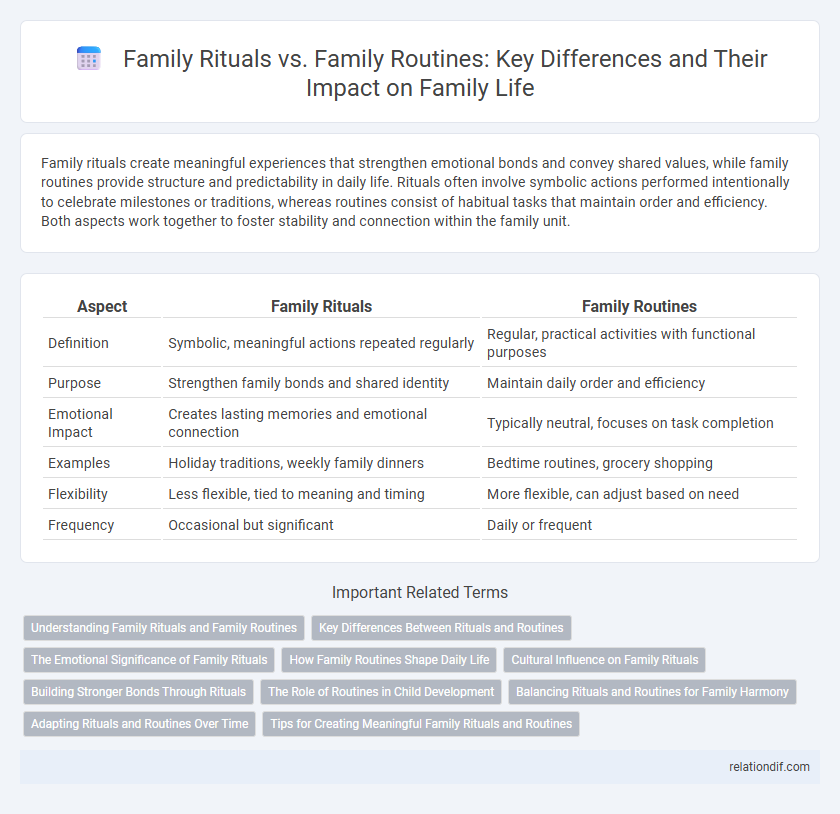Family rituals create meaningful experiences that strengthen emotional bonds and convey shared values, while family routines provide structure and predictability in daily life. Rituals often involve symbolic actions performed intentionally to celebrate milestones or traditions, whereas routines consist of habitual tasks that maintain order and efficiency. Both aspects work together to foster stability and connection within the family unit.
Table of Comparison
| Aspect | Family Rituals | Family Routines |
|---|---|---|
| Definition | Symbolic, meaningful actions repeated regularly | Regular, practical activities with functional purposes |
| Purpose | Strengthen family bonds and shared identity | Maintain daily order and efficiency |
| Emotional Impact | Creates lasting memories and emotional connection | Typically neutral, focuses on task completion |
| Examples | Holiday traditions, weekly family dinners | Bedtime routines, grocery shopping |
| Flexibility | Less flexible, tied to meaning and timing | More flexible, can adjust based on need |
| Frequency | Occasional but significant | Daily or frequent |
Understanding Family Rituals and Family Routines
Family rituals are structured, symbolic activities performed regularly that reinforce shared values and strengthen emotional bonds, such as holiday celebrations or bedtime prayers. Family routines consist of everyday practices like mealtime schedules or morning preparations that provide stability and predictability but lack symbolic meaning. Understanding the distinction helps families balance meaningful traditions with practical habits to foster connection and consistency.
Key Differences Between Rituals and Routines
Family rituals involve symbolic actions imbued with meaning, often marking special occasions or traditions that reinforce family identity and values. Family routines are practical, repetitive behaviors performed regularly to organize daily life, such as mealtime or bedtime practices. The key differences lie in purpose and emotional significance: rituals foster connection and continuity, while routines provide structure and efficiency.
The Emotional Significance of Family Rituals
Family rituals create a deep emotional connection by fostering a sense of belonging and identity that routines alone cannot provide. These meaningful practices strengthen bonds through shared experiences, emotions, and values passed down across generations. Emotional significance in family rituals enhances resilience and promotes long-term psychological well-being within the family unit.
How Family Routines Shape Daily Life
Family routines create a predictable structure that fosters stability and security in daily life, influencing children's behavior and emotional well-being. These repetitive actions, such as meal times and bedtime rituals, help establish clear expectations and reinforce family roles. Consistent family routines contribute to time management, reduce stress, and strengthen bonds by providing shared moments of connection.
Cultural Influence on Family Rituals
Family rituals are deeply shaped by cultural influences that embed traditions, values, and shared meanings into collective practices, distinguishing them from everyday routines. Cultural heritage dictates specific ceremonies, holidays, and symbolic activities that reinforce identity and strengthen emotional bonds across generations. These rituals often involve prescribed behaviors and significance, reflecting the cultural narrative and beliefs unique to each family's background.
Building Stronger Bonds Through Rituals
Family rituals foster deeper emotional connections by creating meaningful and intentional experiences that reinforce shared values and traditions. Unlike routines, which are often habitual and functional, rituals provide a sense of belonging and identity that strengthens trust and communication among family members. Consistently engaging in rituals such as weekly dinners, holiday celebrations, or bedtime stories cultivates resilience and unity that endure beyond everyday interactions.
The Role of Routines in Child Development
Family routines provide children with a predictable structure that fosters emotional security and supports cognitive growth. Consistent daily activities like mealtime, bedtime, and homework routines help develop self-discipline, time management, and social skills. These routines create a stable environment crucial for healthy brain development and positive behavioral outcomes.
Balancing Rituals and Routines for Family Harmony
Balancing family rituals and routines is essential for fostering long-term harmony and emotional connection within the household. Rituals, such as weekly family dinners or holiday traditions, create meaningful moments that strengthen bonds, while routines provide stability and predictability in daily life, such as consistent bedtimes and chore schedules. Integrating both elements helps families cultivate a nurturing environment that supports both security and shared joy.
Adapting Rituals and Routines Over Time
Family rituals provide meaningful traditions that strengthen bonds and create lasting memories, while routines offer structure and predictability for daily life. Over time, adapting these rituals and routines ensures they remain relevant and reflective of the family's evolving values and circumstances. Flexibility in modifying family rituals and routines supports emotional connection and resilience through life transitions.
Tips for Creating Meaningful Family Rituals and Routines
Creating meaningful family rituals involves consistent practices that foster emotional connection and shared values, such as regular family dinners or annual holiday traditions. Establish clear routines that provide structure, like designated homework times or weekend activity planning, ensuring reliability and reducing stress. Incorporate flexibility into rituals to allow adaptation, promoting inclusivity and deepening family bonds through intentional, purposeful activities.
family rituals vs family routines Infographic

 relationdif.com
relationdif.com